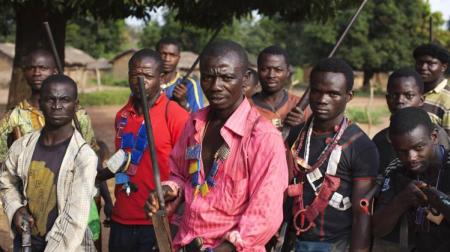Christian Militia Could Wipe Out Central African Republic's Muslim Population, Says Human Rights Group
Christian militia taking revenge on the Central African Republic's Muslim population could drive the entire Islamic group out of the country, a human rights group claimed earlier this week.
The anti-balaka ("anti-machete") has increasingly fought back against the country's minority Muslim population since the Muslim Seleka rebel group antagonized the country's Christians.

Human Rights Watch employees in the Central African Republic have claimed to have witnessed anti-balaka forces cutting "the throats of Muslim civilians, publicly lynching, mutilating, and setting their bodies on fire." It also reported attacks where the groups had cut off body parts or hacked Muslims to death.
It pointed to Yaloké, which prior to the arrival of anti-balaka forces boasted an estimated Muslim population of 30,000 and eight mosques. Now, it is reported that the town has only one mosque and 500 Muslims. Many Muslim homes in the area were also looted by members of the Christian militia.
The report also listed four other former "Muslim strongholds" that were now totally devoid of residents and whose shops and business have been looted by anti-balaka forces.
Peter Bouckaert, Emergencies director at HRW, said there is a good chance that such terrors will drive out a Muslim population which has lived for hundreds of years in the region.
"At this rate, if the targeted violence continues, there will be no Muslims left in much of the Central African Republic. People whose families have peacefully lived in the country for centuries are being forced to leave, or are fleeing the very real threat of violence against them," he said in a statement.
HRW has said the type of language that the anti-balaka groups were using "suggests their intent is to eliminate Muslim residents from the Central African Republic." However, he added that so far the group has not used any religious language to try and justify its actions.
Instead, they claim that they are responding to Seleka attacks that occurred after the group seized power in "March 2013, and carried out a campaign of executions, indiscriminate killings, village burnings, and rape that plunged the country into chaos and displaced nearly a quarter of the country's majority Christian population."
Bouckaert said that regardless of motive, the anti-balaka were finding success at removing their former aggressors.
"Whether the anti-balaka leaders are pursuing a deliberate policy of ethnic cleansing or exacting abusive collective punishment against the Muslim population, the end result is clear: the disappearance of longstanding Muslim communities," Bouckaert said.
Not all Christians have aligned themselves with the anti-balaka.
Father Fagba and his congregation in the town of Boali have opened the doors of their church as a sanctuary to hundreds of desperate Muslims.
Roughly 650 Muslims arrived seeking shelter almost a month ago and have not left — convinced that they will be killed if they step beyond the church grounds.
Fagba told the BBC that the community offered little support for him in his decision to harbor Muslims.
"When I did this, nobody in the community understood me. They attacked and threatened me," he said.
Part of their grudge may be because some of the people Fagba is harboring are only several months removed from terrorizing the country's Christian population.
"I've spoken to those who have done bad things. But I have not mentioned their deeds," he said.
"When I talk to them it's a call for them to change their lives and their behaviour," he added.
Fagba said that it was vital that Christians live out their beliefs in the midst of the violence and terror.
"Now is the time for men of good will to stand up and prove the strength and quality of their faith," said Fagba.
The Central African Republic has a population of 4.5 million. Of that, 50 percent of the country is Christian, 15 percent Muslim and those with indigenous beliefs make up 35 percent.






















